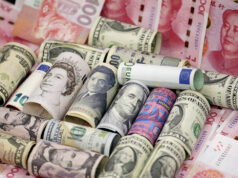Trump is ‘winning’ his trade war and Duterte should join in
What’s funny about this “trade war” are the ironies. Ironic that US President Donald Trump is coming off as the protectionist anti-trade isolationist. Ironic that China is being made to appear by mainstream media as the champion of globalization simply because the latter hates Trump. And ironic that China’s supporters in the Philippines are attacking Trump for “winning” his trade war, when many of those same Filipinos advocated for protectionist measures few years back.
And that’s not all of it.
Trump has warned of the US pulling out of the World Trade Organization, out of what he perceives as the latter’s inability to deal with China’s unfair trade practices. The tactic has been colorfully described by the WTO’s Director-General Roberto Azevêdo: “This guy comes along, and he begins to shake the tree pretty hard. So let’s make sure that some fruits fall. Let’s make sure also that you don’t kill the tree by shaking it too hard.”
But ironically, by calling for a pullout, Trump has “shaken” the WTO from irrelevance; with the EU and Canada leading calls for an updating of trade rules which — due to the untimely death of the Doha Round — remain essentially unchanged ever since the WTO was created in 1995.
But what if Trump eventually “kills” the WTO?
If that happens, while the US does share part of the blame, particularly former US president Barack Obama, who showed an amazing lack of interest in world trade, the EU and Japan certainly played a role in its demise, particularly on their insistence on agriculture subsidies.
And yet, even if it does go, if the trading countries, particularly the richer developed ones, are really serious about trade, then the demise of the WTO shouldn’t matter.
Yes, that’s right: because in a world where governments truly believe in trade, then the WTO is actually a superfluity.
It is only because countries mouth trade but impose trade barriers, either through tariffs, nontariff barriers, and illegal subsidies, that a WTO becomes a necessity.
That is why Trump was correct when he said at the G7 back in June: “You want a tariff-free, you want no barriers, and you want no subsidies, because you have some cases where countries are subsidizing industries, and that’s not fair. So you go tariff-free, you go barrier-free, you go subsidy-free. That’s the way you learned at the Wharton School of Finance. I mean, that would be the ultimate thing.”
As for the trade war with China, that is more optics than anything: firstly, China had no way of winning the “trade war.” As Forbes’ Panos Mourdoukoutas, in his article last August, “China Will Lose The Trade War With America, And That’s Good For Its Citizens,” explains it, China’s “economy is slowing, as it faces the ‘middle income trap,’ and the Lewis turning point. The income trap is a situation where a country’s growth rate slows down as it reaches middle income. The Lewis point is a situation where the ‘reserve army’ of labor shrinks, pushing wages and eroding the country’s competitive advantage in labor intensive industries. Chinese labor becomes expensive vis-à-vis India, Vietnam, and Indonesia. And that places additional pressure on the country’s growth. Meanwhile, China has yet to develop a robust domestic consumer market that will accommodate its growing production capacity.”
Regarding its consumer market, despite China’s claims of being an economic power, the Philippines (and the US) actually ranks way higher in terms of population above the poverty line, with China down below at 168 out of 171 countries surveyed.
What the US is quietly trying to manage is for China to save face and not lose badly.
So, while Trump may triumphantly tweet that China will “remove tariffs on cars coming into China from the US,” that only came after the US itself agreed not to increase tariffs on $200 billion worth of Chinese goods.
China had previously cut non-US automobile tariffs from 25% to 15%, so the removal of the tariffs on US cars should make things relatively square. As it should.
Because while indeed China’s tariffs were apparently to hit US auto exports, China’s automakers are tied up with US car companies: thus, General Motors has a joint-venture with China’s SAIC Motor and Ford is working with Baidu, while Buicks and Cadillacs are numerously made in China as well.
The point: if the Americans are making money, then so do China’s officials running State enterprises.
A true US win over China won’t be about money. It would have to take the form of China starting to play by the rules, particularly international law, the domestic rule of law, and human rights.
In the meantime, if President Rodrigo Duterte is serious about protecting Philippine interests in the West Philippine Sea, then a good way of going about it is to actively seek a Philippine-US Free Trade Agreement, as well as fuller and proper implementation of our trade agreements with Japan.
Jemy Gatdula is a senior fellow of the Philippine Council for Foreign Relations and a Philippine Judicial Academy law lecturer for constitutional philosophy and jurisprudence.
jemygatdula@yahoo.com
www.jemygatdula.blogspot.com
facebook.com/jemy.gatdula
Twitter @jemygatdula


